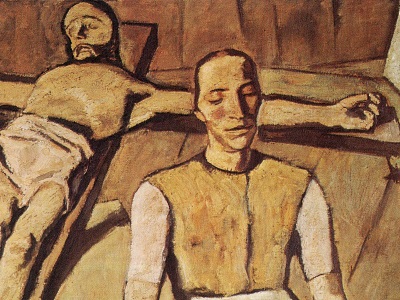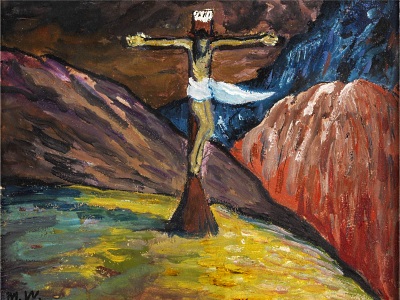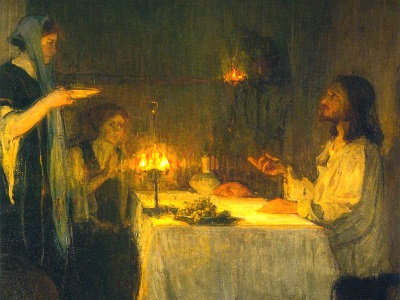In this excerpt from Inner Land (1935), Eberhard Arnold stresses Christ as a person, not a concept or a merely historical figure. Jesus did not bring a new religion, but new life. And his message is meaningless if it does not affect the way we live.
The kingdom of God is the will of God made real. And God’s will is unconditional; it cannot be restricted. It does not acknowledge any other will, and tolerates no rival authority. Nor does it ally itself with anything that curtails, restricts, or limits love. The kingdom of God is power: it is the righteousness of God, the peace of Jesus Christ, and joy in the Holy Spirit.
And God’s kingdom can begin already now, in our time, wherever the peace of Christ reigns. For God sends the Spirit of his Son into our hearts. This brings both obligation and authority: those gripped by this Spirit must drive away all other spirits, and must establish as valid the spiritual laws of the kingdom even in the outer spheres of life.
God’s peace within our hearts will enable us to become builders and bearers of outward peace. For God fills the believing heart with such overflowing joy that it must go out in love to all, driving away the spirits of war and strife, of competition and private property. Those who receive this joy will be drawn, one after the other, into the circle of love and complete community. The Spirit of the church is the Spirit of God’s kingdom – the Spirit of justice, peace, and joy. And it is the church of Jesus Christ that brings this kingdom down to earth here and now.
The Spirit of God works within our hearts, but it brings about outward consequences as well. It wants community in everything, and so it tears down all existing human relationships and builds them up anew. This Spirit does not originate with people, but is poured into believing hearts – hearts which, when filled with God, radiate a faith that strengthens life and increases works a thousandfold. This faith is something personal, and yet it is also objective: it is the confident trust with which Paul declares: “I live, yet it is no longer I who live, but Christ who lives in me; the life I live now in the flesh I live by faith in the Son of God” (Gal. 2:20). There can be no life of faith other than that lived in unity and community with Christ.
Faith is made alive in Christ. We live in Christ, and Christ lives in us; it is he who transforms our lives from within. Luther experienced this mutual relationship only after years of struggle; for this reason, his experience of God is of historical importance. His consciousness of sin and his fear before God’s justice threw him into such agony that he did not know which way to turn. He could find no consolation, either from within or from without, and felt he must perish utterly.
Only through the grace of Christ’s love could he later affirm, writing to his friend Spenlein, that Christ justifies us without our own efforts or works – and that without this justification, we cannot live before God, before ourselves, or before others:
Learn to know Christ, that is, the crucified Christ... Say to him: “You, Lord Jesus, are my righteousness, but I am your sin. You have taken upon yourself what was mine and given me what was yours; you have accepted what you have not been, and given me what I have not been.” Yes, you will learn from Christ himself that, in the same way as he has accepted you, he has made your sins his and his righteousness yours.
This mutual relationship, this receiving and giving of one to the other, is Luther’s understanding of the words: “It is no longer I who live, but Christ who lives in me.” And the certainty of this oneness depends not on us, but on him; we die to ourselves only when our will becomes one with his will to die. Everything we have ever been or experienced or achieved must die at the cross. Only from Christ’s grave can the will be resurrected into freedom.
It is the loneliness of the crucified one that gives us freedom from self-importance. It is the step taken by faith, into death and through the grave, that leads to certainty of life. Christ accepts us so completely that he says, “I am this poor sinner; his sin is my sin, and his death is my death.” This unity in death frees us from sin, despite the most terrifying consciousness of it. We have life in the risen one!
Now Christ is in us: he has taken our lives upon himself. Our old lives are taken away; through his life, we now share all that he is. Everything he possesses he now offers to us. The same Jesus who says, “All power in heaven and on earth has been given to me” now gives us his authority (Matt. 28:18). The same Christ who takes as his own the seat at the right hand of the Father makes us partakers in his divinity. He, the Son of Man, the last Adam, has made us his brothers and sisters.
People often forget that for Luther, faith meant taking hold of the precious and costly treasure itself, that is, Christ. Only Christ himself could give substance and content to Luther’s faith. But we need not define faith; what we need is simply Christ. Christ comes down to us and becomes our life. His coming is faith; what he does is faith. With all their understanding and good intentions, the human forces of piety, wisdom, and religion have no faith. Their efforts to rise up to God are futile. Believing in Christ means quite simply that Christ becomes one with us. It means that he abides in us. The life we have in faith is Christ himself.
And where Christ is, the law that condemns us is forever canceled. Here is Christ, who condemns sin and throttles death! Where he is, everything that destroys life must withdraw. Who shall separate us from the love of Christ? (Rom 8:35) Christ is here! No power can sever us from the love of God as long as he, the most powerful, is our master. If we lose him, there is no help, no consolation, no counsel anywhere. The terror of death will be all there is to know. But to be with Christ means life and peace, within and without.
The life of Christ is energy, for God is dynamic power. Luther says expressly that the Holy Spirit does not leave believers idle, but impels them to “all manner of good, in which they can exercise their faith and prove their Christian character.” But here we must go beyond Luther, for here he goes no further.
If Christ lives in us, he will unfold his powers in us. The justice and righteousness of his Father will become our justice and righteousness. Christ in us means serving others and working for others, for our faith must be as active in love as was his. What he accomplished, we must represent in deed as well.
The unity of Jesus with the Father is so complete that he says, “What is mine is thine, and what is thine is mine.” In the same way, the believers are so united with Christ that they too can say, to Christ and their brothers and sisters, “Mine is thine, and thine mine.” The love of Christ impels them to act and live in this way. The justice and righteousness of Christians is Christ and his life. The Holy Spirit urges them toward the same good deeds that Jesus did.
Those gripped by Jesus have, like him, a love that relinquishes all privileges. When they confess that Christ is their life, like Christ they choose voluntary poverty for the sake of love; like Christ they sacrifice their lives unconditionally for friend and foe, with all they are and have.
Jesus was given all power and might. His love, therefore, must rule unconditionally and unhindered in the lives of those who receive his authority. Only then can he give them his commission. And this commission must fill the whole of life. It must transform all circumstances and relationships in accordance with its objective demands.
We should not say that we believe in Christ and his kingdom – or in unity and community with him – if we do not sacrifice everything and share everything with one another, just as he did. We should not claim that his goodness and his righteousness have become our goodness and our righteousness if we do not give ourselves to the poor and oppressed just as he gave himself to them. We should not think we have experienced the strong one, who exercises all authority at the right hand of the power, if his works of justice and community are not fulfilled in our lives. If we have faith, the working of this faith must become obvious in works of perfect love. If Christ rules in us, his rule must go out from us into all lands. If his Spirit is in us, streams of his Spirit must transform everything around us in accord with his promises about the coming kingdom.
Adapted from Johann Christoph Arnold, ed. Eberhard Arnold, Modern Spiritual Masters (Rifton, NY: 2011). The text is from Eberhard Arnold's Inner Land, the final edition of which was published in 1936, the year following his death. This edition has not yet been uploaded into our digital archive. But see the English translation published by Plough.
Article edited for length and clarity.


